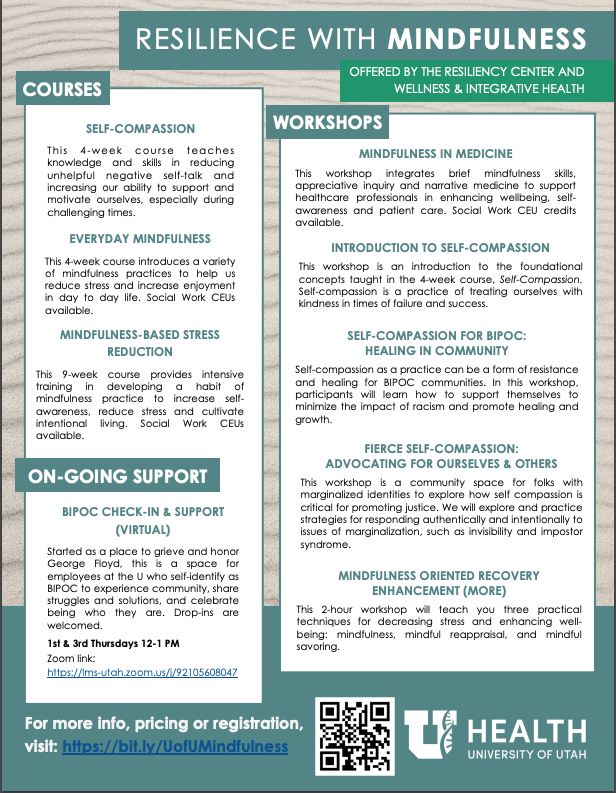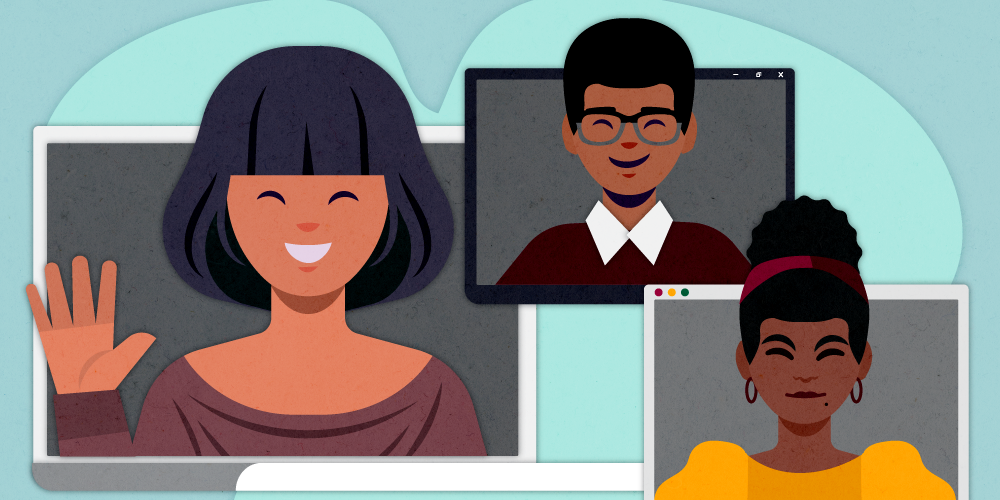Mindfulness Programming

Click here for courses, on-going support, and workshops offered by the Resiliency Center and
Wellness & Integrative Health
the summer of 2020, amid the height of COVID, George Floyd was murdered by a White police officer. He was the first of multiple Black people murdered that summer. Within the University of Utah Health System, people of color were feeling intense stress and anxiety from these events but could not talk about it with colleagues the way they could about COVID.
Faculty and staff of color said that these events were as impactful as COVID, but they were mostly ignored at work. Or if colleagues reached out, they were asking for education, instead of checking in or providing emotional support. The virtual BIPOC Check-in and Support was started as a space to process these racially traumatic events.
A safe place to be heard
The population of Utah is 61- 62% white. This means that many people of color don’t work with others who share their racial background and culture. It can feel isolating, to say the least.
In the beginning, many people joined the BIPOC Check-in because they felt unsafe, unseen and/or unheard during such a difficult time. For many group members, the meetings are the only time where they can really speak with other people of the same race or ethnicity. It provides comfort and a place to heal and decompress.
In the last two years, the group has continued to evolve into a psychologically safe space for BIPOC employees to share their struggles and find advice from people with shared experiences.
Authentic, nonjudgmental support
Many BIPOC staff and faculty have experienced microaggressions or outright bullying within their workspaces. It can be difficult, or even impossible, to talk about these experiences openly in White spaces. But within the support group, they can find authentic connection and understanding. They can talk about whatever they are feeling or experiencing in a professional setting with other professionals from various departments.
Our check-in group is a place to be authentically ourselves, and sometimes it’s the only place where our group members can experience that. The group also provides validation that’s hard to find in other places. Sometimes it can feel like racism is all in your head, but it’s not. It is happening every day, in every part of this country.
Within our support group, you don’t have to justify, defend your feelings, overexplain your experiences, or refrain from speaking about your concerns because of the heavy burden of proof. You are also not met with the expectation of knowing how to solve racism or implement systemic change because you are willing to speak about an experience. We understand. We know. And we recognize the emotional labor of navigating through environments that may judge us for things out of our control.
Tools and strategies for better wellbeing
In addition to discussion, group members also learn about techniques for handling stress. Some BIPOC staff members may walk around every day with anxiety, frustration, and depression and are unsure of how to manage the emotional and physical pain. The group is a chance to learn how to embrace their feelings and work with them in a healthy way. These techniques help extend the therapeutic, healing feelings of the meeting into everyday life.
The group also works together to create strategies to solve work problems concerning racism, sexism, or other forms of bias.
We remind each other that we have a voice we can use, that our concerns are legitimate, that we can speak up to leadership and improve our work environments. We don’t have to stay silent.
The group can also talk about places they feel safe within the community, such as physicians, dentists or businesses that are welcoming to people of all races. It’s just one way you can feel less anxious about everyday life.
A long way to go to create a safe, inclusive workplace
Though the BIPOC Check-in and Support Group is helpful for many, we still have a lot of work to do within the University of Utah to help everyone feel safe and heard, no matter their race or ethnicity.
While race was a huge topic in 2020, it has become less and less discussed even though the need is the same. And now action has been taken against efforts for equity, diversity and inclusion in our state and around the country. As a system, we need to re-educate ourselves to tackling these problems, to having open conversations about hard topics related to race. Diversity is not just religion, sex or gender alone; different races and cultures need to be represented as well.
Creating a safe environment takes effort from everyone, not just BIPOC staff and faculty. We encourage leaders to seek out more knowledge and diversity training for their teams. And we encourage all BIPOC staff and faculty members to join us in our support group during the bi-weekly check-ins for discussion, healing and hope.
Resources
For more information please contact Jamuna.jones@utah.edu
Fierce Self-compassion: Advocating for Ourselves & Others: This workshop is a community space for folks with marginalized identities (gender, sexual orientation, race, class, religion, ability) to explore how self compassion is critical for promoting justice. We will explore and practice strategies for responding authentically and intentionally to issues of marginalization, such as invisibility and impostor syndrome. Open to UHealth Employees and the public.
Trinh Mai
Monet Iheanacho
Atim Effiong
Tatiana Allen-Webb
Jane Nampijja
Karla Motta
Dawnyle Kelley
Maria Guadarrama
Hiroko Hashitani
Whether it was growing up in segregated Georgia, working with leaders across the country during the civil rights movement, leading a congregation at Calvary Baptist Church, or teaching an ethnic studies class at the U, Reverend France A. Davis has lived the theme of “Choosing Love Over Hate.” With the U of U Marriott Library, he shares his experiences and discusses “choosing love” in navigating today’s challenges.
Rising racist aggressions against the backdrop of an anxious and unnerving year can exacerbate the trauma racial groups and minorities experience. Megan Call of the Resiliency Center, social worker Jean Whitlock and EDI expert Mauricio Laguan explain racial trauma and how kindness, to ourselves and each other, is what this moment demands.
Join the University of Utah community as we celebrate Dr. Martin Luther King, Jr.’s life and legacy. Here are suggested readings, resources, events and conversations throughout the week that honor Dr. King’s vision, offer direction, and challenge us to determine a better way forward.
